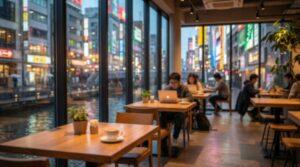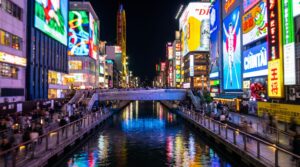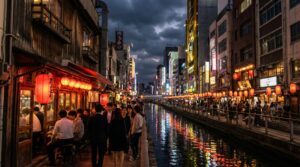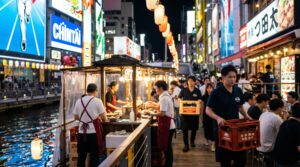Osaka, a city that pulses with a rhythm all its own, is affectionately known as Japan’s kitchen, or tenka no daidokoro. It’s a place where food isn’t just sustenance; it’s a language, a culture, a way of life spoken in sizzling street-side grills and simmering pots of broth. In the heart of this gastronomic wonderland lies Nippombashi, a district that crackles with a unique and vibrant energy. Famous as Den Den Town, the city’s electric town, it’s a dazzling maze of neon lights, towering electronics stores, and sanctuaries for anime and manga lovers. But beneath this shimmering surface of pop culture, a delicious revolution is taking place. A wave of diverse, authentic, and, most importantly, Halal-friendly cuisine is making Nippombashi a must-visit destination for Muslim travelers and curious foodies alike. It’s a place where ancient Japanese culinary traditions meet global flavors, creating a tapestry of tastes that is as exciting and dynamic as the streets themselves. This isn’t just about finding food that meets dietary needs; it’s about discovering a side of Osaka that is warm, welcoming, and wonderfully complex. It’s about experiencing the soul of the city, one delicious, Halal-friendly bite at a time. So, let’s embark on a journey into this electric heartland, where every corner turned reveals a new aroma, a new flavor, and a new story waiting to be told.
Before you dive into the culinary delights of Nippombashi, consider starting your journey with a visit to the iconic Namba Yasaka Shrine.
The Electric Vibe: More Than Just Wires and Manga

To truly understand the food of Nippombashi, you first need to feel its pulse. Step out of Nippombashi Station, and you’re instantly plunged into a world of sensory delight. The main artery, Sakaisuji Avenue, is flanked by multi-story buildings adorned with vibrant advertisements for the latest cameras, computers, and video games. The air buzzes not with the quiet reverence of a Kyoto temple, but with a lively, chaotic symphony of electronic jingles, bustling crowds, and the excited chatter of treasure hunters. This is Den Den Town, Osaka’s counterpart to Tokyo’s Akihabara, and its energy is contagious. Venture into any of the side streets, and the atmosphere transforms. Here, maid cafes with staff in elaborate costumes beckon you inside, gachapon machines offer every imaginable trinket, and hobby shops overflow with model kits and collectible figures. It feels like strolling through a living, breathing anime. The streets serve as a canvas of modern Japanese culture, where passions and hobbies are openly celebrated. Yet amidst this landscape of technology and fantasy, a new scent has blended into the urban fragrance of ozone and aged paperbacks: the irresistible aroma of street food. The sizzle of batter on a hot griddle, the smoky char of grilled meat, and the sweet scent of freshly baked pastries—these now serve as the theme songs of Nippombashi’s back alleys, marking a delicious evolution that makes this district a true feast for all the senses.
A Culinary Welcome: The Rise of Halal in Osaka’s Core
The rise of a thriving Halal food scene in a place like Nippombashi is a compelling story of urban development and cultural exchange. It did not emerge from a grand city plan but evolved naturally from a simple, human impulse: the desire to share and to welcome. As Osaka’s reputation as a world-class travel destination increased, so did the diversity of its visitors. Travelers from Malaysia, Indonesia, the Middle East, and beyond arrived, eager to explore Japan’s attractions but confronted with the challenge of finding food that complied with their faith. Local entrepreneurs, many of whom were Muslims who had made Osaka their home, recognized an opportunity not only for business but also for hospitality. They began opening small stalls, cozy eateries, and restaurants offering flavors of home alongside Japanese classics, all prepared according to Halal principles. This movement was warmly received by Japanese business owners as well, who, embracing the spirit of omotenashi (Japanese hospitality), started adapting their offerings. They began sourcing Halal-certified ingredients, creating pork-free menus, and clearly labeling their dishes. The outcome is the vibrant culinary scene we enjoy today. It stands as a testament to Osaka’s open-hearted character, a city that has always been a merchant town, quick to adapt and eager to please. Thus, finding a Halal-friendly meal in Nippombashi is more than just a transaction; it is an interaction with a community actively building bridges through the universal language of delicious food.
A Gourmet Walk: Savoring Halal Street Food Sensations
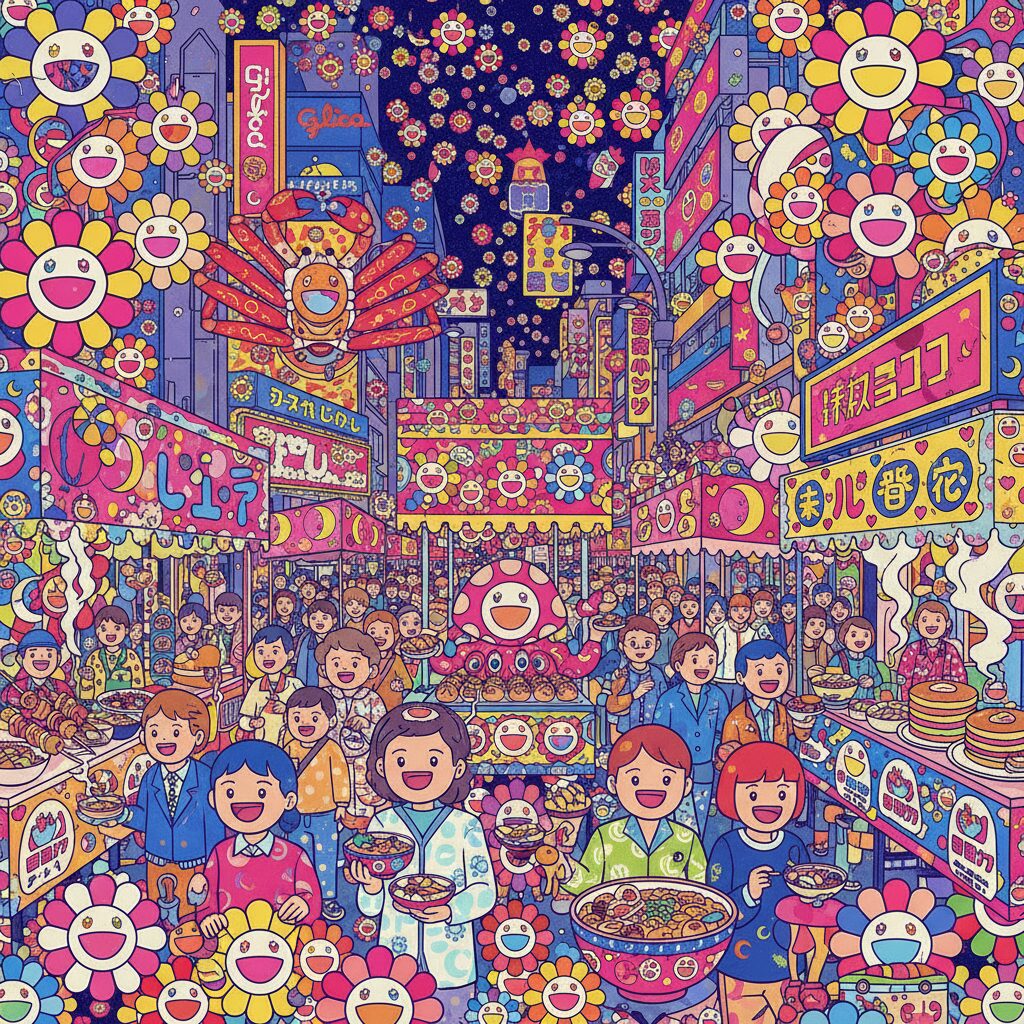
Let’s start our culinary journey right on the bustling streets themselves. The true essence of Osakan food culture is often found not in upscale restaurants, but at simple stalls where artisans perfect a single dish. One of the first sights you’ll likely encounter is a stall dedicated to takoyaki, the iconic Osaka snack. Imagine this: a cast-iron pan lined with hemispherical molds, into which a savory, dashi-infused batter is poured. A generous piece of octopus (tako) is placed in the center of each mold, followed by sprinkles of pickled ginger and green onion. The real skill comes with the flipping. Using two small metal picks, the vendor expertly and rhythmically turns the half-cooked spheres, transforming them into perfectly golden-brown balls. For Muslim visitors, the sauce has traditionally been a challenge, often containing mirin (rice wine), and sometimes this applies to the batter as well. However, here in Nippombashi, you’ll find stalls that have mastered a Halal-friendly recipe. They use a specially crafted sauce, rich in the umami of soy and fruit but completely free of alcohol. The resulting takoyaki are a revelation. The outside is slightly crisp, revealing a molten, creamy interior where the tender octopus offers a satisfying chew. Topped with that signature sauce, a drizzle of Japanese mayonnaise, a sprinkle of green aonori seaweed, and dancing katsuobushi (bonito flakes), it creates a symphony of textures and flavors in every bite. Eating this piping hot from a paper boat tray, trying not to burn your tongue in your excitement, is a quintessential Osaka experience now accessible to everyone.
Just a short stroll away, another enticing aroma might lure you in: that of okonomiyaki. Often described as a Japanese savory pancake, this dish is a hearty, soulful treat. The name itself means “grilled as you like it,” and traditionally it involves a batter mixed with cabbage and other ingredients, often including pork belly slices. Finding a Halal version was once nearly impossible. But now, dedicated eateries in the Nippombashi area are revolutionizing the scene. They’ve swapped pork for succulent chicken, tender beef, or a variety of fresh seafood like squid and shrimp. The griddle sizzles as the batter is poured and shaped into a thick circle, topped with your chosen protein and a mound of finely shredded cabbage. It’s cooked slowly, allowing the inside to become fluffy while the outside develops a beautiful char. Once done, it’s coated with that same delicious, custom-made Halal okonomiyaki sauce, striped with mayonnaise, and finished with bonito flakes. It’s a complete, satisfying meal that captures the generous and unpretentious spirit of Osaka’s food culture. Sharing a large okonomiyaki with friends, slicing off steaming wedges with a small metal spatula, is a joyful and communal experience.
Don’t stop there. Keep an eye out for stalls offering Halal karaage, Japanese-style fried chicken. This is no ordinary fried chicken. Thigh meat morsels are marinated in a blend of soy sauce, garlic, and ginger before being lightly coated in potato starch and double-fried to crispy perfection. The result is incredibly juicy chicken with a shatteringly crisp crust. The Halal versions ensure every ingredient in the marinade and frying oil meets strict standards. Served in a paper cup with a slice of lemon to squeeze on top, it’s the perfect portable snack to fuel your adventures through Den Den Town’s endless arcades and shops. Each bite bursts with savory, garlicky flavor, making you reach for the next piece before finishing the last.
Beyond the Streets: Cozy Halal Eateries and Restaurants
While street food captures the vibrant, fast-paced spirit of Osaka, sometimes you want to sit down, unwind, and enjoy a full meal. Nippombashi and its surrounding neighborhoods boast an impressive selection of Halal restaurants that meet this desire, offering a diverse range of cuisines.
Picture stepping away from the neon-lit streets into the inviting warmth of a Halal ramen shop. The air is filled with the rich, aromatic steam rising from large vats of broth. Unlike traditional ramen, which almost always uses pork-based (tonkotsu) broth, these places have perfected the craft of developing deep, intricate flavors using chicken, seafood, or vegetables. One popular variety is tori paitan, a creamy chicken broth simmered for hours until it becomes thick and emulsified, rivaling the richness of any tonkotsu. Springy noodles are immersed in this sumptuous soup and garnished with tender chicken chashu, a marinated soft-boiled egg with a jammy yolk, crisp bamboo shoots, and fresh green onions. Some shops also offer spicy miso or salt-based broths, providing a unique flavor experience for every palate. Slurping a bowl of authentic, Halal Japanese ramen is a deeply satisfying moment—a culinary holy grail for many Muslim visitors—and in Nippombashi, it’s an achievable delight.
For those longing for a taste of home or a different culinary adventure, the area serves as a vibrant hub for international Halal cuisine. Turkish restaurants feature vertical rotisseries slowly turning massive shawarma cones, the seasoned meat gleaming under the heat. The friendly owner expertly shaves thin slices of chicken or beef, packing them into warm pita bread with fresh vegetables and creamy garlic sauce. The mingling aromas of spices and roasting meat create a welcoming, familiar atmosphere. Just a few doors away, you may find a small, family-run Indonesian eatery offering dishes like Nasi Goreng or rich, flavorful Rendang. The complex blend of lemongrass, galangal, and chili provides a fiery and fragrant contrast to the subtler tastes of Japanese cuisine. These international restaurants are more than just dining spots; they are cultural hubs where expatriates and travelers meet, sharing stories over meals that remind them of home. They add a vibrant dimension to Nippombashi’s character, highlighting its role as a true global crossroads.
Navigating Kuromon Market: Halal Finds in Osaka’s Kitchen

Just a stone’s throw from the heart of Den Den Town lies Kuromon Ichiba Market, an expansive covered market that has fueled Osaka’s culinary scene for over a century. Known as “Osaka’s Kitchen,” its narrow alleys are packed with over 150 stalls offering everything from gleaming fresh seafood and prime beef cuts to exotic fruits and traditional sweets. For the Halal-conscious traveler, Kuromon provides both an exciting opportunity and a slight challenge. Although the market isn’t exclusively Halal, it’s a treasure trove of naturally Halal-friendly ingredients, especially from the sea.
Your first stop should be one of the many seafood vendors. Here, you’ll witness massive tuna being skillfully carved, live scallops still in their shells, and trays of vibrant orange sea urchin (uni). Many stalls will prepare their offerings for you on the spot. Point to a plump scallop, and they will shuck it, top it with a knob of butter and a splash of soy sauce (it’s best to ask if you can have it without soy sauce, or just with butter and lemon, to be safe), then grill it over a charcoal flame until sizzling and fragrant. The flavor is sublime—sweet, briny, and perfectly tender. Similarly, you can enjoy freshly shucked oysters with a squeeze of lemon or savor a serving of uni, which is creamy, rich, and reminiscent of the ocean. Since these items are pure and unadulterated, they make excellent Halal choices. Another delicious option is grilled squid (ikayaki) or octopus tentacles on a stick, simply seasoned with salt. The key at Kuromon is communication. Many vendors are now used to international visitors and their dietary questions. Stick to simple, grilled seafood, and you’ll have an unforgettable culinary experience.
Beyond the seafood, explore the fruit stalls. Japan is renowned for its flawless, almost impossibly beautiful fruit. At Kuromon, you can buy a single, giant white strawberry bursting with sweet, floral flavor or a slice of perfectly chilled crown melon. It’s a refreshing, healthy way to cleanse your palate. You may also find stalls making fresh mochi, a soft, chewy rice cake. Be sure to ask about the fillings, as some may contain non-Halal ingredients, though plain or red bean-filled varieties are often safe and delicious treats. Kuromon Market encourages mindful eating; by observing, asking questions, and choosing simple, fresh ingredients, you can fully enjoy the feast that is Osaka’s Kitchen.
Practical Wisdom for Your Culinary Adventure
Embarking on a Halal food journey through Nippombashi is an exciting adventure. With a bit of preparation, your experience can become even more seamless and enjoyable. Here are some tips to help guide you along the way.
Getting There and Getting Around
Nippombashi is very easy to access. It’s served by two subway lines: the Sakaisuji Line and the Sennichimae Line at Nippombashi Station. It’s also just a short, pleasant walk from major hubs like Namba Station (a key point for Nankai, JR, and various subway lines) and Dotonbori. The main part of Den Den Town stretches along Sakaisuji Avenue, south of the Dotonbori canal. Exploring on foot is the best approach, as some of the most interesting finds are tucked away in the narrow side streets and alleys branching off the main roads.
The Rhythm of the District: When to Visit
Nippombashi comes alive from late morning until evening. Most shops open around 11:00 AM and close around 7:00 or 8:00 PM. Food stalls and restaurants often stay open later, particularly on weekends. The area is most vibrant in the afternoon and early evening, when shoppers fill the streets and neon lights begin to glow, giving the district a futuristic ambiance. Weekends draw much larger crowds, which can be enjoyable if you like a lively scene, but weekday visits offer a more relaxed pace if you prefer to explore at your own speed.
The Language of Food: Communicating Your Needs
While many Halal spots feature clear signage, you might sometimes need to inquire about ingredients. Don’t worry—Japanese locals are generally very helpful and willing to assist. Knowing a few key phrases can be very empowering. A polite “Sumimasen” (Excuse me) will always attract attention. To ask if a dish contains pork, say, “Kore wa butaniku ga haitte imasu ka?” For questions about alcohol, you can ask, “Kore ni arukoru wa haitte imasu ka?” Having a translation app handy or a card that outlines your dietary restrictions in Japanese can also be quite useful.
Understanding the Labels: Halal, Muslim-Friendly, and Pork-Free
As you explore, you’ll come across various terms. “Halal-Certified” means the establishment has been officially certified by a recognized Halal authority, offering the highest level of assurance. “Muslim-Owned” indicates that the owners are Muslim and, although the restaurant may not have official certification, the food is prepared following Halal principles. Terms like “Muslim-Friendly” or “Pork-Free” are typically used by Japanese-owned businesses to show their efforts to accommodate Muslim diners. These places may offer pork-free menus and use separate cooking utensils but might still serve alcohol on-site. Understanding these distinctions will help you make choices that fit your personal comfort level.
A Moment for Prayer: Finding Serenity
For Muslim travelers, having a place for daily prayers is important. While Nippombashi itself does not have a mosque nearby, Osaka is a welcoming city with several mosques in the greater area, such as the Osaka Masjid in Nishiyodogawa ward. Many major department stores and shopping centers in nearby Namba and Shinsaibashi have begun providing dedicated prayer rooms. It’s always a good idea to check online resources or apps like Halal Navi or Japan Masjid Finder for the latest info on prayer spaces near you. Taking a moment for peaceful reflection can be a refreshing way to recharge before diving back into the district’s vibrant energy.
The Cultural Intersection: Anime, Faith, and Flavor
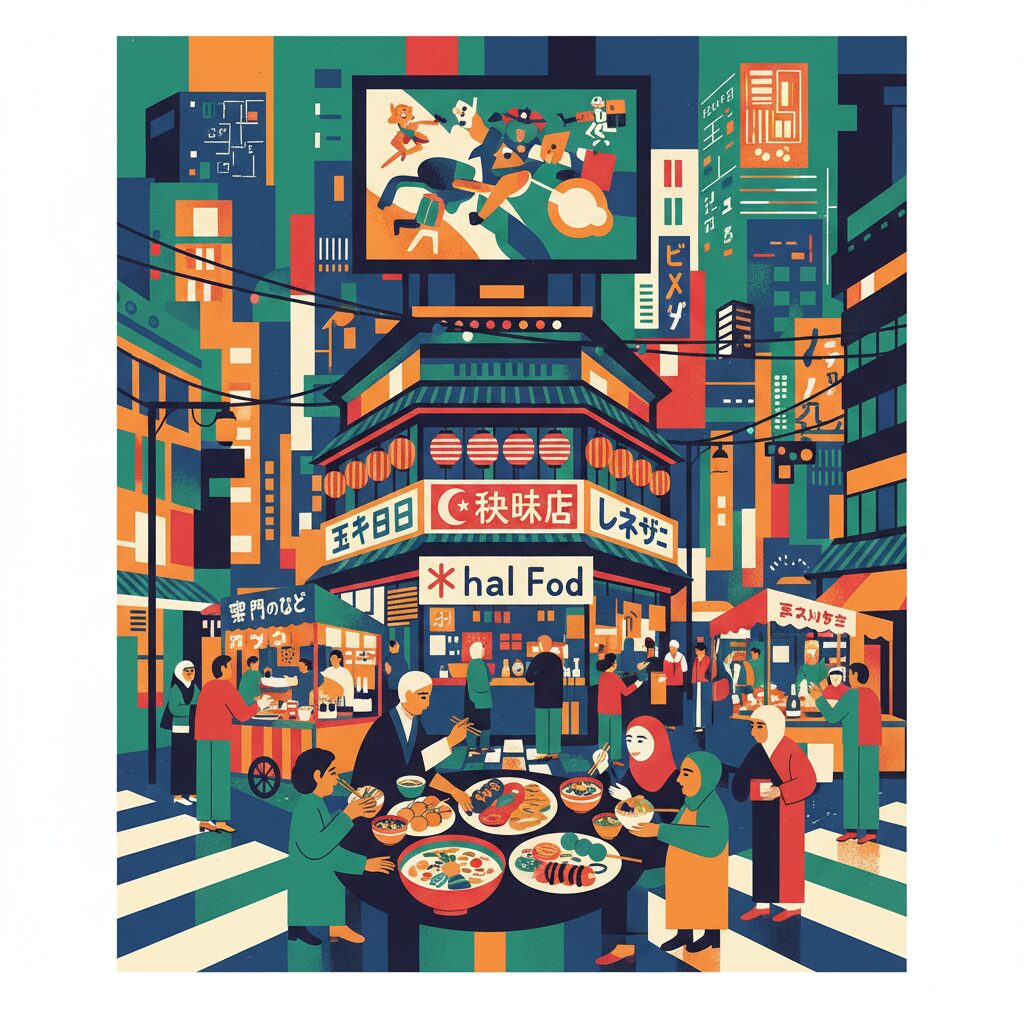
What makes the Nippombashi experience so uniquely captivating is this beautiful, unexpected blend of worlds. On one street, you can dive into the niche realm of Japanese otaku culture, hunting for rare manga or cheering in a retro arcade. Just around the corner, you might find yourself in a cozy restaurant, enjoying a bowl of Halal ramen or a fragrant plate of biryani. This fusion isn’t forced; it’s a natural coexistence that speaks volumes about modern Osaka. Here, a shop selling intricate robot models can share a wall with a kebab stand run by a Turkish family. It’s a place where pop culture enthusiasts and seekers of faith walk the same streets, both in pursuit of something that brings joy and fulfillment. This district shows that culture is not fixed but fluid, constantly evolving and welcoming new influences. The Halal food scene hasn’t replaced the character of Den Den Town; it has enriched it, adding a new, delicious layer to its identity and making it a more inclusive and fascinating place for everyone. It stands as a living example of how a city can honor its traditions while warmly embracing the world.
Your Osaka Adventure Awaits
Nippombashi is more than simply a district; it’s an experience. It’s a journey into the electric core of Osaka, a place full of vibrant contrasts and wonderful discoveries. It’s where the future meets the past, where Japanese pop culture blends with global culinary traditions, and where the spirit of hospitality shines most brightly. For the Halal traveler, it is a destination of freedom and flavor, where you can immerse yourself in the local culture without compromising your faith. Strolling through its streets, savoring everything from sizzling takoyaki to a comforting bowl of ramen, creates a story you’ll cherish for years. So arrive with an empty stomach and an open heart. Let the neon lights be your guide and the enticing aromas be your map. Explore, taste, connect, and uncover the incredible, welcoming, and truly unforgettable world of Halal food in Osaka Nippombashi. The city’s kitchen has a special spot reserved just for you.





